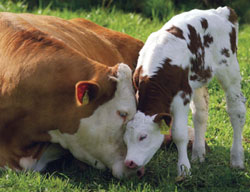by Rona Fried
In a wonderful and surprising move, Walmart released a policy on farm animals – who give their lives for human food, enduring the most horrid of conditions (yes, I am a longtime vegetarian for these reasons).
They say:
"There is growing public interest in how food is produced and consumers have questions about whether current practices match their values and expectations about the well-being of farm animals."
"We believe that farm animals in our supply chain should be treated humanely throughout their lives and that the welfare of farm animals should be considered in selection of all production systems, practices and technologies. Walmart US and Sam’s Club US are committed to continuous improvement in the welfare of farm animals in our supply chain.
WOW.

They go on to say:
First, we expect our suppliers will not tolerate animal abuse of any kind.
Second, we support the globally-recognized "Five Freedoms of Animal Welfare" as a goals for our supply chain:
- Freedom from Hunger and Thirst – provide ready access to fresh water and a diet that maintains full health and vigor.
- Freedom from Discomfort – provide an appropriate living environment that includes shelter and a place to rest comfortably.
- Freedom from Pain, Injury or Disease – ensure prevention or rapid diagnosis and treatment.
- Freedom to Express Normal Behavior – provide sufficient space, proper facilities and company of the animal’s own kind.
- Freedom from Fear and Distress – ensure conditions and treatment avoid mental suffering.
Third, we will work with our supply chain partners to implement practices consistent with the Five Freedoms of animal welfare.
Walmart and Sam’s Club US are asking suppliers of meat, deli, dairy and eggs to:
- Report to authorities and take appropriate disciplinary and corrective action in any cases of animal abuse.
- Adopt and implement the Five Freedoms principles in their operations and publish a corporate policy on animal welfare.
-
Find and implement solutions that address animal welfare concerns including, but not limited to:
a. Housing systems that lack sufficient space, enrichment or socialization (for example, sow gestation crates, hen battery cages and veal crates);
b. Painful procedures where avoidable or without pain management (for example, tail docking, de-horning and castration);
c. Euthanasia or slaughter without rendering an animal insensible to pain. -
Promote transparency by providing an animal welfare report to Walmart and publicly reporting against their animal welfare policy on an annual basis.
With Walmart and Sam’s Club having a staggering 25% share of the US grocery market, they could – after all these years of sorrow and pain – turn the factory farming system on its head.
This is a first step. Walmart hasn’t set timelines for freeing animals from cages, but it does warn agribusiness that the time for animal confinement is coming to an end.
Another policy that’s rocking that world is California’s new law. All eggs sold in the state must come from chickens that have a modicum of space, and it pretty much bans veal crates, chicken battery cages, and pig gestation crates.
Over 60 of the largest food companies are eliminating the cruel practice of pig gestation crates from supply chains including Nestlé, McDonald’s, Burger King, Subway, Sodexo and Compass Group, and even Brazil’s largest pig producer.
Besides the criminal inhumanity, confined animal operations are among the biggest polluters, creating gigantic waste ponds that threaten our air and water, and are a major source of methane emissions. They also consume much of our farmland (and water) producing low-grade corn for these animals – which they were never meant to eat.
In the US, where the amount of meat in peoples’ diets has been falling since 2004, average consumption of beef per person
has dropped by more than 13% and chicken by 5%. Fish
consumption has also dropped, but just by 2%.
Read The American Humane Society’s timeline on the many corporations that have made animal welfare pledges in the past few years, from Starbucks to McDonald’s:
